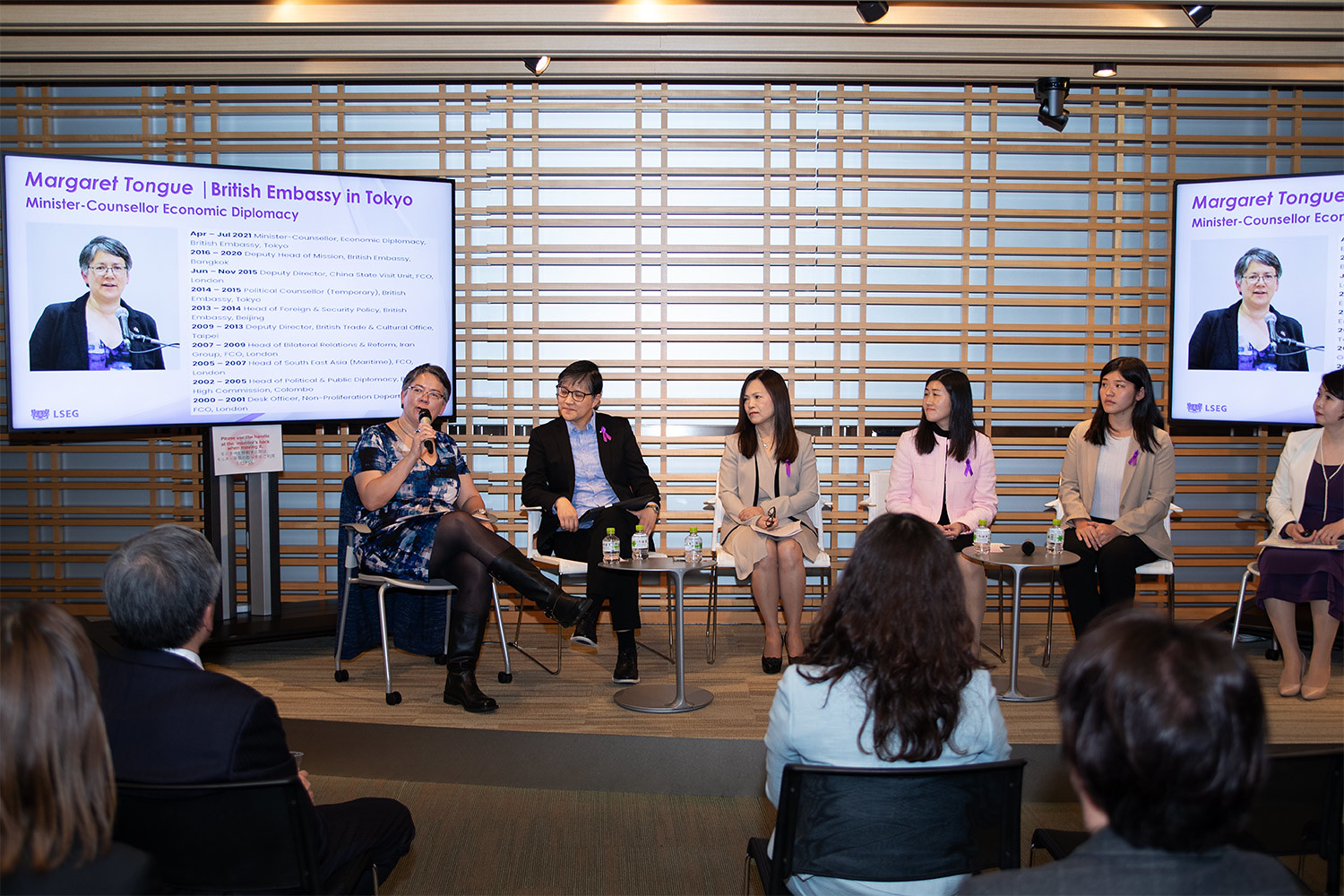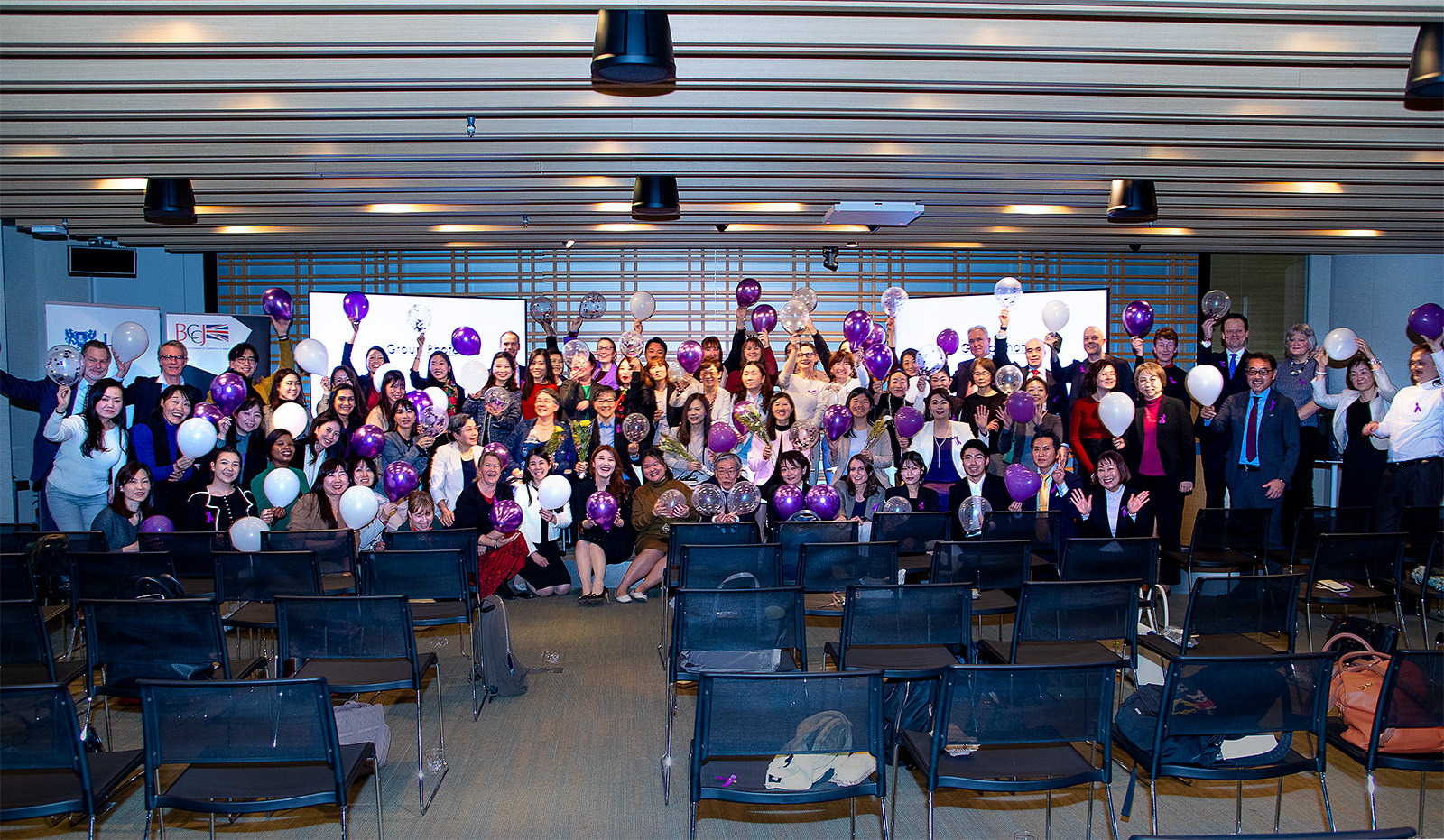Member? Please login
International Women’s Day 2024: Inspire Inclusion

Written by Sterling Content
March 22, 2024
Past Event Round Ups
Photography credit: Calderwood Images
Japan’s mixed progress on gender equality and potential workplace solutions were put in the spotlight as the world marked International Women’s Day (IWD) on March 8. The global day honours the social, economic, cultural and political achievements of women while promoting women’s rights.
Japan’s current global rankings highlight the challenges facing women in Asia’s second-biggest economy. Japan ranked a lowly 125th out of 146 countries in the World Economic Forum’s “Global Gender Gap Report 2023,” with a gender pay gap for full-time earners of about 22%: “among the widest in the OECD.”
On a more positive note, in 2022 the employment rate for women aged 25–39 surpassed 80% for the first time since records began. Overall, the female labour force participation rate reached 74% in 2022 from 63% in 2012, helped by enhanced childcare support and improved maternity leave policies.
Closing the gender gap could boost Japan’s gross domestic product by as much as 9%, according to the International Monetary Fund, supporting women’s economic empowerment while providing a vital extra source of workers in a rapidly ageing society.
The British Chamber of Commerce in Japan (BCCJ) celebrated IWD with an event in central Tokyo co-hosted by the London Stock Exchange Group (LESG) on March 7. Entitled “Inspire Inclusion,” the function focused on how member organisations are responding to workplace inequalities and featured prominent female speakers.
The panel comprised Natsuki Funabiki (TDC Global), Joy Ho (Unilever Japan), Kaoru Iijima (Barclays), Satsuki Inoue (British Airways & Iberia), Yuki Miura (LSEG) and Margaret Tongue (British Embassy, Tokyo).
BCCJ member good practice
TDC Global’s Funabiki introduced her firm’s “Diversity, Equity, Inclusion (DEI) Maturity Evaluator,” a tool that helps organisations assess their DEI maturity across culture, hiring, promotion and training.
“It’s not a tick the box [exercise] – it’s a journey and about understanding where the priorities are,” she said.
While noting that many Japanese companies consider DEI “a very scary subject,” Funabiki said firms should focus on areas of strength and opportunity, together with DEI’s relationship with the broader business strategy.
Unilever’s Ho said the 120-year-old company had taken tangible steps to ensure equity, diversity and inclusion. Tackling harmful social norms and biases is a vital part of its efforts, and Unilever Japan removed gender, first names and photos from job applicants’ resumes.
“We want to eliminate potential unconscious bias … so everyone gets evaluated fairly,” she said.
The British consumer goods giant has also introduced “WAA” (Work from Anywhere and Anytime) in Japan to give all employees greater flexibility.
Barclays’ Iijima said the British bank had a proud tradition of female empowerment, including appointing the UK’s first female bank manager in the 1950s and being the first financial services company to join the United Nations global solidarity movement for gender equality, HeForShe.
“We have DEI working groups, with five strategy priorities: workforce diversity; leadership accountability; transparency and accountability; optimising external relationships; and inclusive and equitable culture,” she said.
The bank has set gender ambitions for having women occupy a third of senior leadership roles by the end of 2025.
She also pointed to the bank’s internal survey on inclusion, with its score climbing to 82% in 2022, up from 76% in 2020.
In the aviation sector, British Airways’ Inoue noted the significance of Japan Airlines appointing its first female president – a rare step for a major Japanese company and global airline.
“It’s quite encouraging to know that JAL has taken this step … I think this will make a huge change in our industry, not just aviation but the travel industry as a whole,” Inoue said.
The British Embassy’s Tongue pointed to tangible steps towards gender equality such as the UK Foreign Office’s “mirror wall.”

“Inside the Foreign Office building in London there is a wall and it shows all of the most senior jobs … And where there has been a woman [appointed] there is a picture of the first woman in that job, and where there hasn’t been a woman, there is a mirror,” she said. “The idea is that women look at it and think maybe I could do this job – an example of a conscious and deliberate message.”
However, she also warned that the official message can be undermined, such as a female friend being told she was “too ambitious” to seek promotion, so it is important for organisations to ensure that the overall culture supports DEI efforts.
Further, Barclays’ Iijima said that according to a report by ESGClarity, the percentage of Tokyo Stock Exchange-listed companies without female board directors had dropped to 18.7% in 2022, down from 84% in 2013. However, “only 8% of Japanese boards consist of 30% women compared to 100% in France, 80% in the UK and 58% in the US.”
Asked about work-life balance, the panel stressed the need to have “me time,” to allow junior members of staff to speak up and to ensure female voices are heard. The issue of menopause was also raised, particularly given the growing number of senior women in leadership positions.
Gender equality is “not one solution – it has to be a lot of different elements. You have to look at how you can create a more inclusive working environment,” Tongue said.
“When you change [policies] to make them more inclusive you’re also changing them to reflect the modern conditions of the workplace, so it’s not just a DEI benefit but also a wider benefit,” she added.








